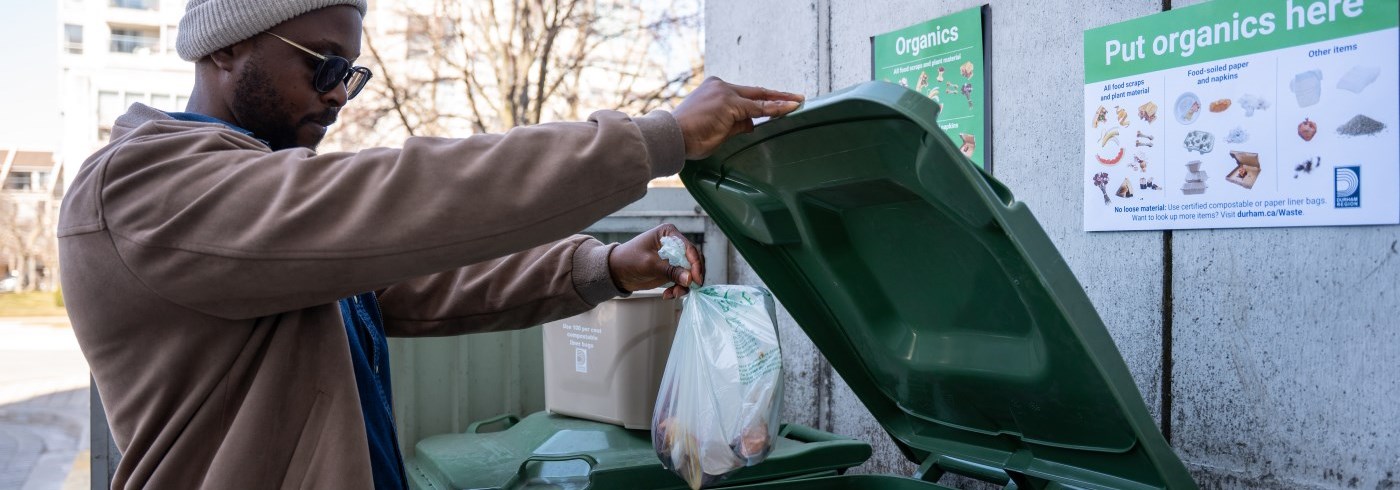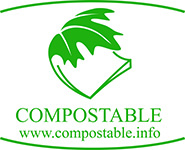
Apartment and Townhouse Collection
Green Bin program is expanding to include apartments and condos
Watch our video and learn how to properly dispose of your organic waste.
Our service areas
We provide waste diversion programs to apartment and townhouse sites in:
- Ajax
- Brock
- Clarington
- Pickering
- Scugog
- Uxbridge
Apartments and townhouses receiving municipal waste collection services in the City of Oshawa and the Town of Whitby, should contact their respective municipal office for information on waste collection service.
| Green Bin |
|
The Green Bin program is rolling out to apartment and condo residents in Durham Region. You can put all kinds of food waste in your green bin—whether it's raw, frozen, dried, cooked, or spoiled. Just remember to remove any packaging before you throw it in. You can also place items like pet waste, pet litter, diapers, menstrual products, and used paper products (tissues and paper towels) in the green bin. Residents will soon receive kitchen containers and compostable bags to collect food waste and other Green Bin items. When full, tie the bag and place in the green bin located in your buildings waste collection area. Please reach out to your Superintendent or Property Manager for information regarding the Green Bin program in your building.
Watch our video and discover useful tips to reduce the "ick" factor while participating in the Green Bin program. Accepted materialsFood waste
Paper products
Other compostable items
Unacceptable materials
Green bin linersYou can line your kitchen bin or your curbside bin. Use only certified compostable or paper liners. When buying liners, buy only certified compostable liners. They should have one of these logos on the box:
|
| Recycling |
|
The recycling program in Ontario is managed by Circular Materials. Accepted materialsPlace all containers in the containers blue cart. Rinse all food containers. Make sure there is no grease, liquids or food in them.
Place all paper products in the papers blue cart.
Unacceptable materials
|
| Garbage |
|
Put your garbage in the onsite bins. Furniture and large item collection is by appointment only. Your building manager makes these appointments. Accepted materials
|
| Battery Recycling |
Some buildings have a battery recycling program. Participating buildings have special collection bins in the building. Ask your building manager if your building has a program.
Accepted materials
Unaccepted materials
Drop off unacceptable batteries at a waste management facility. Safe battery storageStore batteries in a cool, dry place. Store them away from any flammable materials. In storage, battery terminals should not touch conductive materials. Cover the terminals on 9-volt batteries before storing them. |
| Electronics Recycling |
| It is your responsibility to remove all personal data from your electronics.
Some buildings have an electronic recycling program. Participating buildings have special collection bins in the building. Ask your building manager if your building takes part in the program. Accepted materials
|
| Used Clothing Collection |
|
Do you have old or torn clothing? Participating buildings have special clothing donation boxes. Ask your building manager if your building has a program. Accepted materials
|
Property managers and superintendents
Durham Region offers green bin organics and waste collection services to approved properties in:
- Ajax
- Brock
- Clarington
- Pickering
- Uxbridge
Apartments and townhouses receiving municipal waste collection services in the City of Oshawa and the Town of Whitby, should contact their respective municipal office for information on waste collection service.
The recycling program in Durham is overseen by Circular Materials, a national not-for-profit organization that manages the shared collection system across Ontario.
The Region considers property owners or managers as the primary contacts and leads for waste collection services at their properties. To help ensure the success of waste diversion programs and maintain ongoing waste collection services, property owners should:
- Keep the Region informed with up-to-date contact details for the building by calling 311 (within Regional limits) or 1-800-372-1102, or by email.
- Designate a central area for green bin and recycling stations for tenants.
- Collaborate with current and new superintendents to support and maintain waste diversion programs at the property.
- Include a clause in tenant leases that requires participation in green bin and recycling programs.
Superintendent "Responsibilities"
As a superintendent, the success of the waste diversion program in your building relies on your efforts. You play a vital role in ensuring tenants properly use the green bin and recycling carts.
All superintendents should:
- Ensure bins are at the designated set out spot, unlocked, and ready for pickup before 7 a.m. on your scheduled collection day.
- Co-ordinate with the Region to provide both new and existing tenants with the necessary tools and resources.
- Keep promotional materials posted and in good condition.
- Monitor green bins and recycling carts to prevent contamination.
- Contaminated bins and carts will not be collected.
We're here to help!
Contact us by email or call us at 311 (within Regional limits), 905-668-7711 or toll-free 1-800-372-1102.
| Green Bin | ||||||
|
As part of the Regional waste management initiative, all buildings receiving Regional garbage collection are required to participate in the Green Bin Program. This program helps reduce waste and promote sustainability by encouraging proper disposal of food waste and other green bin waste. To make participation easy, each resident will receive an in-unit kitchen container, which is designed for collecting food waste and other green bin materials. Once full, residents can deposit the waste into the building’s designated green bin or appropriate waste chute. If residents need more in-unit kitchen containers, magnets or brochures, or you have any questions regarding collection, please contact us by email or call 311 (within Regional limits), 905-668-7711 or toll-free 1-800-372-1102.
|
||||||
| Recycling | ||||||
|
Ontario’s recycling program is managed by Circular Materials. Circular Materials and their local collection contractor will perform the following services:
All recycling related inquiries should be directed to your local contractor, Miller Waste Systems using the following contact information:
|
||||||
| Battery Recycling | ||||||
|
The Region of Durham has partnered with Environmental 360 Solutions Limited (E360) to provide collection containers for used batteries at participating multi-residential properties. These containers, located in lobbies or recycling areas, allow residents to dispose of their batteries safely. E360 offers courier service for collecting full containers on a call-in basis. Containers must be placed indoors in a visible, accessible area. When full, building managers arrange for the shipment of batteries to E360 for processing. Contact info is provided on the containers. Batteries should be stored in a cool, dry area, away from flammable materials, and battery terminals, especially on nine-volt batteries, should be covered. Safe storageBatteries should be stored in a cool, dry location, away from any flammable material. During storage, battery terminals should not be in contact with conductive materials. The terminals on nine volt batteries, in particular, should be covered prior to storage. Battery types accepted
Due to regulatory requirements, only undamaged household batteries are acceptable for collection. Residents with damaged, leaking or wet cell batteries (such as automotive), should place the batteries in a leak-proof container and deliver them to a Regional Waste Management Facility for recycling. |
||||||
| Electronics Recycling | ||||||
|
The Region of Durham operates an easy-to-use electronics recycling program in apartment buildings and townhouse neighbourhoods at municipally approved properties. This free recycling service provides residents with a convenient way to recycle their end-of-life or unwanted electronics. Alta E-Solutions provides storage containers and all materials necessary to promote the program. Residents bring electronics to the designated recycling area for scheduled collection. Properties are reviewed prior to beginning collection to ensure that safe collection and storage can occur. Indoor storage is recommended to avoid scavenging. Collection is conducted on a scheduled basis by Alta E-Solutions. Larger items that do not fit into the 95 gallon carts, such as TVs and stereo systems, can be placed beside the carts for collection. Maintenance by onsite staff is required to ensure electronic waste is the only material in the bins. |
||||||
| Used Clothing Collection | ||||||
|
Diabetes Canada will provide donation bins inside multi-residential sites. Participating buildings are supplied with the bin and Diabetes Canada empties it weekly. Additional collections can be scheduled. All material collected is donated to charity. Materials accepted
|
||||||
| Garbage Collection | ||||||
|
Not all multi-residential properties receive municipal waste service. Approval is granted based on the Region’s Waste Management By-law and Technical and Risk Management Guidelines for waste collection services on private property. Durham Region provides waste collection services at approved properties in the City of Pickering, Town of Ajax, Townships of Brock, Scugog and Uxbridge and the Municipality of Clarington. Front-end waste bins are supplied for residential waste only. No renovation and construction waste is accepted in the bins. Waste service can be suspended or cancelled if unacceptable material is continually found in the bins. Large bulky items should not be placed in the bins but in a designated area so they can be safely collected. Collection of bulky and metal goods, which includes furniture, appliances, mattresses and other large household items, requires a scheduled pick-up by appointment in the Municipality of Clarington and Townships of Brock, Scugog and Uxbridge only. Buildings located in the City of Pickering and Town of Ajax can place items out on regular collection day. The property manager or superintendent must make an appointment to have bulky and metal goods collected in Clarington, Brock, Scugog and Uxbridge. Contact us by email or call us at 311 (within Regional limits), 905-668-7711 or toll-free 1-800-372-1102. For garbage collection in Oshawa and Whitby:Apartments and townhouses receiving municipal waste collection services in the City of Oshawa and the Town of Whitby, should contact their respective municipal office for information on garbage and bulky goods collection service. City of Oshawa 905-436-3311 Town of Whitby 905-668-3437 |
Contact Us






